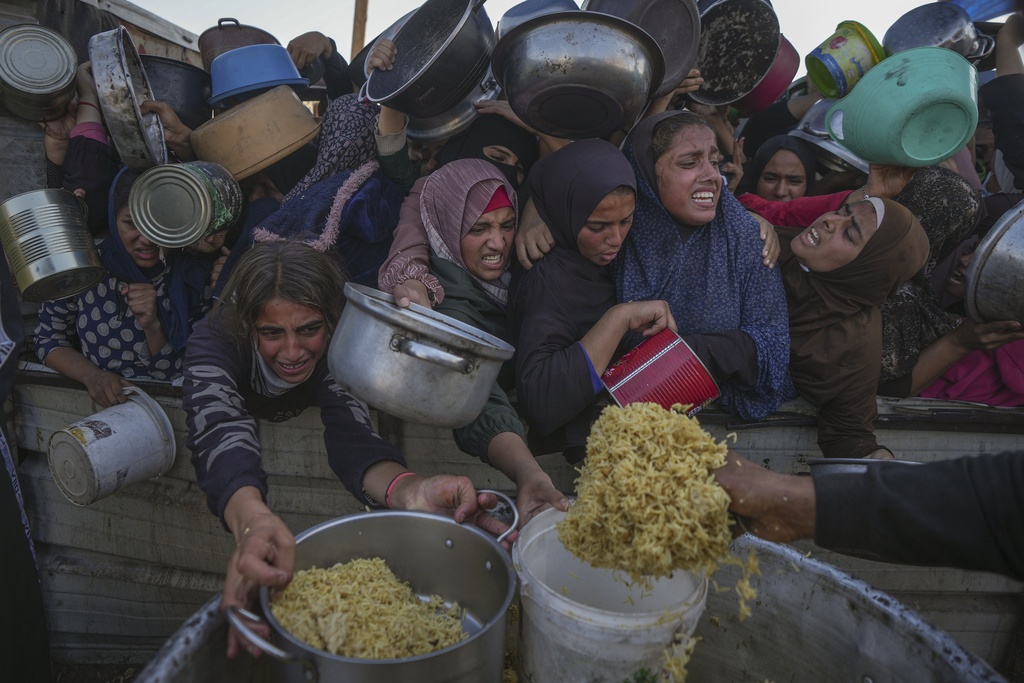DEIR AL-BALAH, Gaza Strip (AP) — Israeli strikes pounded the Gaza Strip overnight and into Wednesday, with one attack ripping through a home where displaced people were sheltering in the isolated north. The strikes killed at least 33 people including children, Palestinian health officials said.
Violence also flared in outside Jerusalem, where an Israeli bus came under fire from a suspected Palestinian attacker late Wednesday, wounding three people including a 10-year-old boy, according to the military and hospital officials. The attack took place on a highway near major Israeli settlements in the occupied West Bank, and the army was looking for the shooter in the area around Bethlehem.
The Israel-Hamas war in Gaza shows no end in sight, even after Israel reached a ceasefire with Lebanon’s Hezbollah militants and attention shifted to the overthrow of Syrian President Bashar Assad by insurgents. Both the current and incoming US administrations have said they hope to end the war in Gaza before the inauguration in January, but ceasefire talks have repeatedly stalled.
Israeli strike in north Gaza wipes out 3 generations
The strike on the home killed 19 people in the northern town of Beit Lahiya near the border with Israel, according to nearby Kamal Adwan Hospital, which received the bodies. Hospital records show that a family of eight was among those killed: four children, their parents and two grandparents.
The Israeli military said it targeted a Hamas militant in the vicinity of the hospital. It said reports about the number of casualties in the strike were inaccurate, without elaborating.
The military says it tries to avoid harming civilians and accuses militants of hiding among them, putting their lives in danger.
The hospital said another strike near its entrance on Wednesday killed a woman and her two children.
The hospital director, Dr. Hussam Abu Safiya, said Israeli drones struck nearby residential blocks overnight, causing explosions that sparked panic among the facility’s more than 120 sick and wounded patients.
“We have received distress calls from neighbors and trapped people, but we’re not able to leave the hospital because of the continued risk,” he said. “We are witnessing a massive loss of life, with many martyrs in the targeted areas.”
Another strike in the decades-old Nuseirat refugee camp in central Gaza killed at least seven people, according to the Awda Hospital. The dead included two children, their parents and three other relatives, it said. Later, the hospital said another attack hit the same camp, killing four people and injuring 16 more.
There was no immediate comment from the Israeli military on the other strikes.
In Lebanon, where near-daily Israeli attacks have continued despite the ceasefire, at least five people died Wednesday in Israeli strikes in the south, according to Lebanon’s Health Ministry and state news agency.
UN says Gaza civilians face ‘utterly devastating situation’
Israel has been waging a renewed offensive against Hamas militants in Gaza’s heavily destroyed north since early October. Troops have surrounded Beit Lahiya, Beit Hanoun and the urban Jabaliya refugee camp, allowing in almost no humanitarian aid and ordering tens of thousands to flee to nearby Gaza City.

Israeli officials have said the three communities are mostly deserted. However, the United Nations humanitarian office said Tuesday it believes around 65,000 to 75,000 people are still there, with little access to food, water, electricity, or health care. Experts have warned that the north may be experiencing famine.
Sigrid Kaag, the senior UN humanitarian and reconstruction coordinator for Gaza, told reporters on Tuesday that civilians trying to survive all across Gaza face an “utterly devastating situation.”
She pointed to the breakdown in law and order and looting that has left the UN and many aid organizations unable to deliver food and other humanitarian essentials to hundreds of thousands of Palestinians in need.
Kaag said she and other UN officials repeatedly ask Israel for access for convoys to northern Gaza and elsewhere, to allow in commercial goods, to reopen the Rafah crossing from Egypt in the south and to approve dual-use items.
The Israeli military says it allows in enough humanitarian aid and blames UN agencies for not distributing it, saying large amounts of aid have accumulated just inside Gaza’s borders. UN officials say Israeli restrictions, the breakdown of law and order and ongoing fighting make it difficult to access the aid and distribute it, and have repeatedly called for a ceasefire.
The United States, Egypt and Qatar have mediated talks between Israel and Hamas for nearly a year, and diplomats say those efforts have recently gained momentum.
But Hamas has said it will not release the remaining hostages without an end to the war and a full withdrawal of Israeli troops. Israeli Prime Minister Benjamin Netanyahu has pledged to continue the war until Hamas is destroyed and all the hostages are returned and has said Israel will maintain a lasting military presence in some areas.








